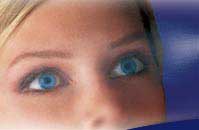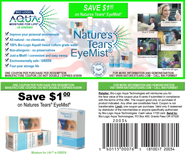
FOR IMMEDIATE RELEASE - November 21, 2011
Rogue Media
541-474-0950
Allergy Eye and Dry Eye Relief Education
Sharon Kleyne, Founder of Bio Logic Aqua Research, Discusses Allergy Eye Relief and Dry Eye
Sharon Kleyne, Founder of Bio Logic Aqua Research, on dry eye education, allergy relief, and tear film education.
Allergy Eye.

It is one of life's paradoxes: Your eyes drive you crazy from itching due to spring or summer allergies. And yet-as you know all too well-the one thing you must not do is scratch or rub them.
This article will not tell you it is finally OK to scratch or rub itching eyeballs. That is irritating, inflammatory, and embeds the offending pollen and irritants in the cornea and conjunctiva. The article will, however, offer alternatives to scratching and present recently developed information about the condition known as "allergy eye."
The Tear Film.
The eye's first line of defense against allergies is the complex and extremely thin tear film that covers the optical surface. Numerous environmental factors, from air pollution to air conditioning, can cause evaporation that result in slight, moderate or even severe tear film moisture loss (dehydration). This may be so slight that you don't feel any symptoms. However, if you happen to be sensitive to allergens such as pollen, the allergic reaction will be more severe if your tear film is not functioning at full capacity. Bio-Logic Aqua Technologies Biomedical Research has discovered that the best (and least expensive) way to mitigate the effect of allergens and other airborne irritants on the eyes is to pay attention to the health of your tear film.
What is an Allergy?
An "allergy" may be defined as "an adverse immunological reaction to a substance that normally does not produce such a reaction." Adverse reactions to things like pollen, mold spores and pet dander (called "allergens"), are an allergy because most people are not bothered by them. An adverse reaction to cigarette smoke or bee stings is not technically an allergy because nearly everybody reacts to them.
The typical allergic reaction produces symptoms in the eyes, breathing passages and skin. Some allergens only bother the eyes. This article will concern itself only with the effects of allergies on the eyes -- even if the same allergy also affects other areas -- and how to help defend the eyes not only against allergens but all airborne irritants.
A New Discovery.
It is common knowledge among specialists that allergy eye (especially pollen allergies) is worse in hot, dry weather and better in cool, humid weather. That is because many allergy eye symptoms result from dehydration of the tear film's aqueous (water) layer, thereby creating an over-concentration of irritants and allergens. Reflex tearing tries to wash out these irritants and restore the tear film's chemical and moisture balance. However, the reflex tears themselves may contain histamines and chemical imbalances.
Standard remedies such as eye drops and redness relievers may be ineffective against allergy eye because they can wash away the natural tear film, including the evaporation-slowing lipid layer. Chemicals in these products can create their own adverse reactions.
The best way to soothe allergy eye, and mitigate the effect of environmental challenges that dehydrate the tear film, is to emulate cool, humid weather by adding add pure, pH-balanced humidity to the air around the eyes. The humid mist will find its way into the tear film's aqueous layer in just the right amount (two to five nanoliters) to help alleviate symptoms naturally and without harsh medicines, drops or chemical formulations.









